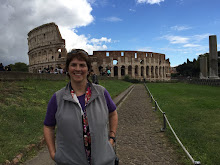So, she did some digging, and in doing so, became fascinated with addresses and their meaning. By meaning, I don't necessarily mean why they were named a certain name, but what really lies behind that street name, and how not having an address (or having a certain address) can mean a chance at improving your life, or a chance to brag about living in a wealthy area. An address means people can find you, and some people are just fine living "two miles past that gravel road, across from the Mills Family and right by the old gas station".
Ms. Mask explores ancient Roman addresses--actually, the lack of addresses; how Nazis began a campaign of changing addresses in Jewish towns and cities as another way to wipe Jews out of existence. She looks at William Penn and his desire to create a system of addresses that were neat and orderly (very unlike England, which has a hodgepodge of streets every where--but that is the charm of England!); how the battle of apartheid still rages in South Africa over changing street names.
There are more interesting people and places to explore in The Address Book. What I find extremely interesting is how much we tie our identity into our addresses. And really, how much of a disservice we do to homeless people by demanding they have a permanent address in order to qualify for services they desperately need. As Ms. Mask rightly points out, we no longer have land lines--we don't call a place, we call a person-so why should we require a home address on an application for a job, or an application for assistance? People are contacted by phone or email the vast majority of the time, not by mail to a street address.
Luckily, there are a lot of folks around the world who have made it their mission to solve the address problems that keep so many people helpless in their desire to escape poverty. I found this book so interesting! It will definitely make you stop and think.
In my city of Cedar Rapids, we have NE, NW, SE, SW attached to most of our addresses. It immediately tells people generally where you live--upper class, middle class, in the flood zone, in the poorer areas of the city--in a new development--which side of the Cedar River. If you live over by Brucemore, most people know you live in what used to be the wealthiest part of town--and still is quite impressive, if you look at the large early 20th century stately homes and the boulevards. They're just not new homes--those are on another side of town now, and they're just as big.
It's interesting to think about addresses--I'll admit after reading this book I have thought about my address, and what it says about where I live. I think about how Cedar Rapids grew over the decades and engulfed smaller communities and the only way they're remembered are by street names.
I so enjoyed this book. It definitely would make an excellent book club discussion, or a great gift for history buffs or folks who love maps and urban development.
Rating: 4/6 for a study on the emotional ties we have to place names; how history has shaped our cultural ties to street names, city designs, and what it all means in the digital age.
Available in paperback, hardcover, ebook, and audio.



No comments :
Post a Comment